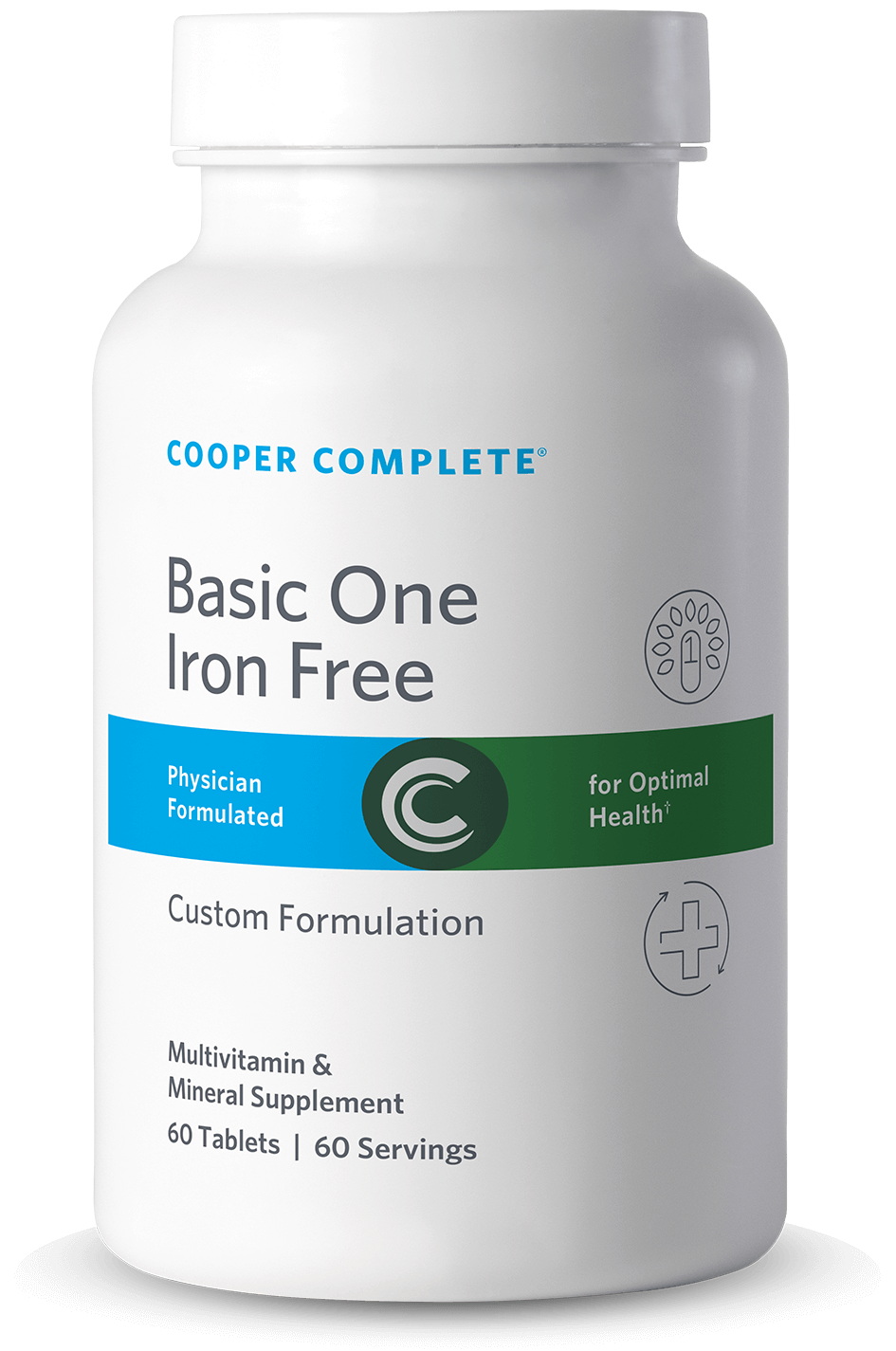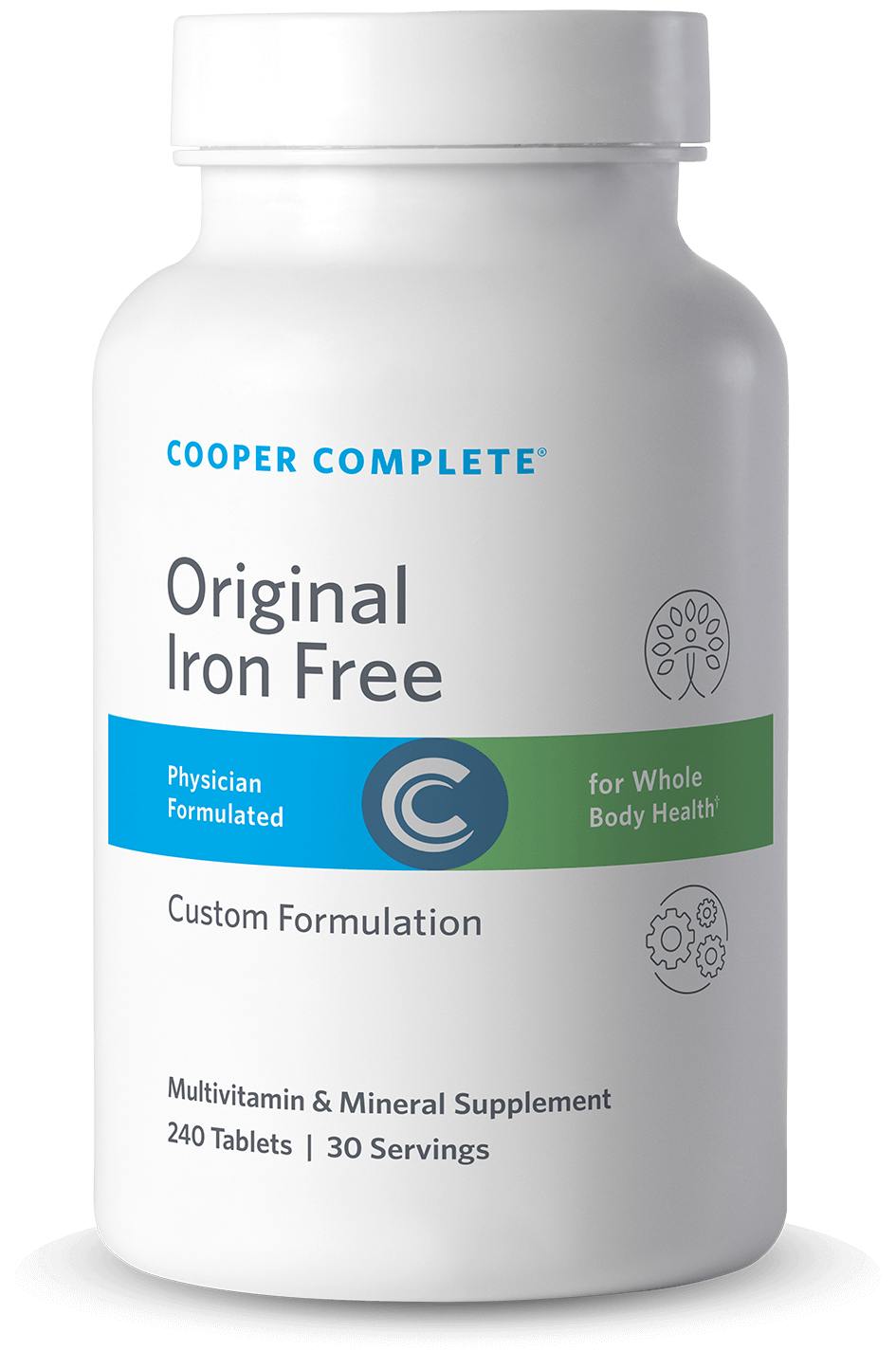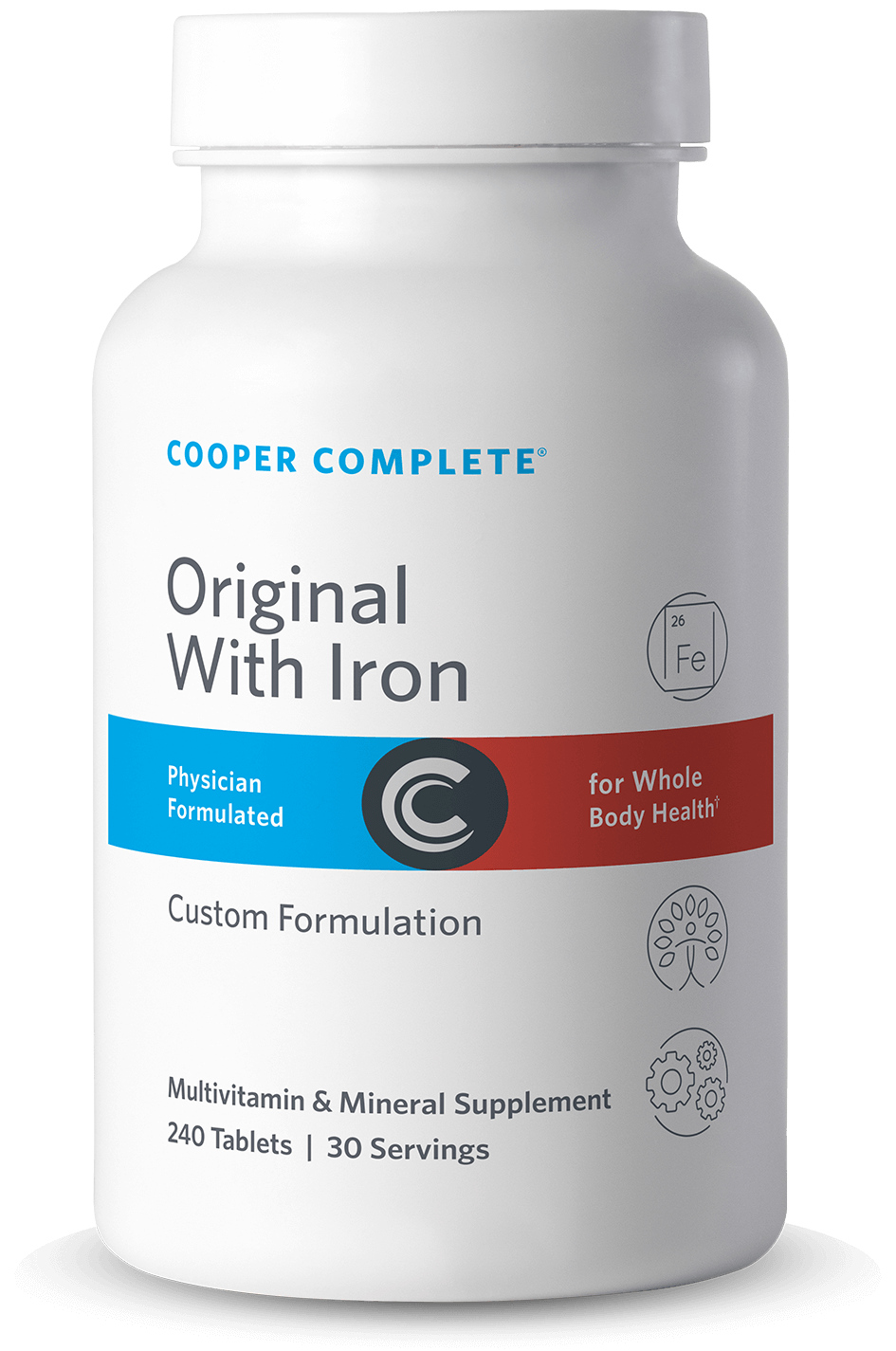Reasons To Take A Multivitamin

According to the Center for Disease Control and Prevention’s National Center for Health Statistics, nearly 58 percent of U.S. adults age 20 and older take dietary supplements. Multivitamins are the most common type of supplement, taken by almost 30 percent of adults 40-59 and 40 percent of adults 60 plus.
With so many individual vitamins and nutrients available to address specific nutritional needs and conditions, why do so many adults choose to take multivitamins on a daily basis? Are they consuming ingredients they don’t really need? Is there a risk of getting too much of a good thing?
The primary reason for taking dietary supplements, in general, is also a reason multivitamins may be your best supplement of choice: nutritional deficiencies. As hard as we try to maintain a healthy diet of fruits, vegetables, good sources of protein and healthy fats, doing so consistently can be a challenge. For example, fewer than 10 percent of Americans consume the estimated average required amounts of vitamins D and E in their diet alone.
Even if we do maintain healthy diets, factors such as age, medical conditions and the medications we take can result in nutrient deficiencies, making supplementation essential. Tyler C. Cooper, MD, MPH, Cooper Clinic Preventive Medicine Physician and Cooper Aerobics President and CEO, says it best, “… supplements are not magic pills to make you feel better. That’s not their purpose. They exist to do what their name says, supplement your diet in a positive and beneficial way.”
To answer the question of reasons to take a multivitamin, we take a comprehensive look at 28 vitamins and nutrients found in most multivitamin products—including Cooper Complete Original, Basic One and Multivitamin Gummy—you may be surprised at the benefits each offers to your health and well-being.
Reasons To Take A Multivitamin: A Foundation of Vitamins
Vitamin A (as Beta Carotene) – Immune, Skin and Eye Health
An antioxidant that protects our cells from damage caused by the oxidation of free radicals, beta carotene is converted by the body into vitamin A, which supports a strong immune system and healthy eyes, skin and mucous membranes. Free radicals are naturally occurring molecules that attack healthy cells and tissues with damaging effects which increase with age and may play a role in heart disease, cancer and other diseases.
Vitamin C – Immune System and Collagen Formation
An essential nutrient involved in the repair of tissue, formation of collagen and the enzymatic production of certain neurotransmitters, vitamin C also acts as an antioxidant to support healthy immune system function. Vitamin C also helps improve the absorption of iron from plant-based foods.

Basic One Daily Multivitamin Iron Free
Basic One daily multivitamin contains methylated (5-MTHF) folate and vitamin B12, 50 mcg (2000 IU) vitamin D3, magnesium, zinc and other premium vitamins and minerals in amounts proven beneficial to optimal health.
$29.98 Add to cartVitamin D3 – Strong Bones, Teeth and Immune Functions
Cooper Clinic Founder and Preventive Medicine Pioneer Kenneth H. Cooper, MD, MPH, shares, “Many patients we test at Cooper Clinic are low in vitamin D.” This essential vitamin keeps bones and teeth strong and supports a strong immune system. Because it is difficult to get enough vitamin D in our diets and time in the sunshine, supplementation is key. Most adults need a daily minimum of 50 mcg (2000 IU) of vitamin D, the amount found in Cooper Complete Original and Basic One Multivitamins.
Vitamin E – Immune Function
A fat-soluble antioxidant found only in plant-based foods including vegetables, fruits, nuts and certain oils, vitamin E plays an important role in protecting cells and tissues from the damaging effects of free radicals, actually helping slow the aging process. The health benefits of vitamin E include support of a healthy immune function, as well as blood, brain and skin health. (The fat-soluble vitamins are vitamins A, D, E and K, and are absorbed along with fats in the diet and are stored in the liver and the body’s fatty tissue.)
Vitamin K – Supports Normal Blood Clotting
Vitamin K is a fat-soluble nutrient found primarily in several green vegetables, eggs, fish and fermented products such as sauerkraut. One of vitamin K’s most important roles is to produce some of the proteins required for blood clotting. Vitamin K also strengthens bones by helping make osteocalcin, which prevents low bone density. Some studies also suggest vitamin K may ease morning sickness, protect cognitive ability and even reduce the risk of cardiovascular disease. Cooper Complete nutritional supplements contain vitamin K1 (phylloquinone).
Thiamin (Vitamin B1) – Energy Metabolism
Found in whole grains, meat and fish—and often in fortified breads and cereals—thiamin helps the body convert food into usable energy, playing a critical role in energy metabolism. Thiamin deficiency can cause weight loss, muscle weakness, short-term memory loss and other mental signs and symptoms. Because this vitamin is stored in very small amounts in the liver and has a relatively short half-life, thiamin requires a regular, consistent supply.
Riboflavin (Vitamin B2) – Cell Function and Energy Production
Often used to prevent migraine headaches and treat muscle cramps, riboflavin is a water-soluble vitamin widely studied for its antioxidant, anti-inflammatory and anti-aging properties. Found in a wide variety of foods, including milk, eggs, certain fruits and legumes, as well as dark, leafy vegetables, riboflavin plays a role in the metabolic processes and is necessary for proper cell function and energy production.
Niacin (Vitamin B3) – Energy and DNA Support
Another water-soluble vitamin from the B family, niacin helps convert nutrients into energy, produce and repair DNA, lower cholesterol and fats and manage arthritis symptoms through its antioxidant effects. While relatively rare, severe niacin deficiencies can cause constipation and diarrhea, depression, headaches and fatigue. You’ll find niacin in a variety of foods, including red meat, poultry and fish, as well as brown rice, nuts, seeds and bananas.
Vitamin B6 – Inflammatory Support
Research conducted by The Cooper Institute® shows that, when taken along with vitamin C as part of a 24-ingredient multivitamin, vitamin B6 significantly reduced blood levels of C-reactive protein (CRP), a systemic marker for inflammation associated with increased risk of cardiovascular disease and diabetes. Vitamin B6 is commonly found in fish, organ meats, starchy vegetables such as chickpeas and potatoes and non-citrus fruits.
Folate – Mood Health and Inflammatory Support
Produced naturally in foods including green, leafy vegetables, avocados, citrus, eggs and beans, folate offers a wide range of health benefits. Known for its role in preventing birth defects in women of childbearing age, folate has also been shown to reduce the risk of many types of cancer, decrease depression symptoms, help regulate homocysteine levels—which, at high levels may damage arteries and lead to cardiovascular disease—and support brain health.
Vitamin B12 – Healthy Brain Function
According to the National Institutes of Health, as many as 43 percent of older adults are affected by vitamin B12 deficiency, with conditions that can mimic the signs of aging. “In some cases of B12 deficiencies, it can affect one’s balance, neurological function and even lead to pernicious anemia,” says Camron Nelson, MD, Cooper Clinic President and CEO and Preventive Medicine Physician.
A vitamin critical for healthy brain function and red blood cell production, most Americans get enough vitamin B12 in their diets. But, our ability to absorb it affects the health benefits it delivers. Unlike the vitamin contained in nutritional supplements, the naturally occurring vitamin B12 found in fish, beef, poultry, eggs and dairy products needs a protein produced in the stomach for optimal absorption. Older adults and vegetarians, as well as individuals with certain autoimmune diseases, Crohn’s and celiac disease and those who have had stomach or intestinal surgeries may not produce enough of this stomach protein, putting them at risk for vitamin B12 deficiencies.
Biotin (Vitamin B7) – Energy, Skin, Hair and Nail Support
Known for its support of healthy hair, skin and nails, biotin is an essential nutrient that helps convert carbohydrates, fats and proteins into energy and aid healthy cell function. Biotin is available in healthy diets that include beef, beef liver, pork and eggs and is included in Cooper Complete Original Multivitamin.

Original Comprehensive Multivitamin Iron Free
Experience the difference - top-rated physician-formulated and recommended multivitamin and mineral supplement packed with 25 key vitamins and minerals, including Zinc, Magnesium, Potassium, Biotin, Selenium, Copper, Vitamins A, C, D, E, K, and activated B vitamins.†
$54.98 Add to cartPantothenic Acid (Vitamin B5) – Digestion and Nervous System Function
Naturally present in a wide variety of foods, including beef, chicken, milk, eggs and avocados, to name a few, pantothenic acid is essential for blood cell production, maintaining a healthy digestive tract and a properly-functioning nervous system, in addition to helping build and break down fatty acids. A member of the B vitamin family, pantothenic acid also helps produce sex- and stress-related hormones and supports healthy skin, eyes and hair.
Reasons To Take A Multivitamin: Essential Minerals
Iron – Oxygen Transport and Nervous System Function
The World Health Organization (WHO) identified iron deficiency as the most prevalent nutritional deficiency—commonly referred to as anemia—affecting 1 in 4 of the global population. While more prevalent in developing countries vs. the U.S., iron deficiency is most common among vegetarians, vegans, young children and women in their childbearing years. Even in America, the CDC found that fewer than 15 percent of Americans consume the daily recommended amount of fruits and vegetables, the top sources of iron.
An essential mineral for transporting oxygen throughout the body and supporting the nervous system, low levels of iron can affect levels of dopamine and serotonin, resulting in fatigue, low energy and a compromised immune system. “Many of my female patients will be low in ferritin, which means they are iron deficient,” says Carolyn Terry, MD and Cooper Clinic preventive medicine physician. “If that’s the case, I recommend they take Cooper Complete Basic One Multivitamin with Iron or Original Multivitamin with Iron.”
Phosphorus – Muscle, Nerve and Kidney Function
The second-most plentiful mineral in the body, phosphorus is concentrated in bones and teeth and assists kidney function, muscle contractions and nerve signaling. Natural sources of phosphorus in foods include meat, poultry, fish, bread, eggs and dairy products. Cooper Complete Original Multivitamin includes 160 mg of phosphorus in each daily dose.
Iodine – Energy and Thyroid Function
Our bodies need iodine to help convert food into energy and produce thyroid hormones, which are essential for controlling metabolism and other bodily functions. Iodine is also beneficial for heart health, diabetes management, eye health and breast cancer prevention. Since the body does not produce iodine, it must be consumed in food and nutritional supplements, including Cooper Complete Original Multivitamin.
Magnesium – Immune, Muscle and Nerve Function
Even though magnesium is found in a wide variety of foods—including beef, poultry, salmon, almonds, beans and dairy products—half of all Americans are deficient in this important mineral. Essential for regulating muscle and nerve function and supporting a healthy immune system, our body’s ability to metabolize vitamin D depends on magnesium. Without magnesium, vitamin D remains stored and inactive in the body, unable to deliver its health benefits.
Often difficult to distinguish from the symptoms of other health issues, signs of magnesium deficiency include fatigue, loss of appetite, nausea, stiffness and muscle spasms. At adequate levels, however (400-420 mg/day for men; 300-310 mg/day for women), magnesium helps regulate blood glucose levels and blood pressure while promoting healthy muscle and nerve function.
Zinc – Immune Function and Eye Health
Zinc is a trace mineral found throughout the body and found in foods such as beef, chicken and fortified breakfast cereals. Zinc helps our immune system fight off invading bacteria and viruses while supporting metabolism function. Commonly taken to minimize the effects of colds, research shows this mineral may also help wounds heal, reduce the symptoms of diarrhea and slow the progression of age-related macular degeneration (eye disease).
Selenium – Thyroid Function and DNA Production
Found in bread, grains, meat, poultry, fish and eggs, selenium is a trace mineral nutritionally essential for overall health. Selenium supports reproduction, thyroid gland function and production of DNA, while protecting the body from damage caused by free radicals and viral infections.
Copper – Blood Vessel, Nerve, Bone and Immune System Function
Available in diets that include oysters and other shellfish, as well as beef liver, whole grains, beans, nuts and potatoes, copper is essential for the production of red blood cells and supports healthy blood vessels, nerves, bones and the immune system. Cooper Complete Original Multivitamin contains 2 mg copper, the recommended daily value.
Chromium – Insulin Function
The trivalent form of chromium is the trace mineral essential for insulin function. Found in foods including whole wheat bread, orange juice, garlic and some green vegetables, chromium may help the body break down and absorb carbohydrates, fats and proteins and is sometimes used to control blood sugar for diabetes, though these benefits are not currently supported by research.
Potassium – Muscle and Blood Pressure Function
A mineral essential for all tissues in the body, potassium is well known for the relief of muscle cramps. While also helping build muscle and break down carbohydrates, research shows potassium can help reduce the risk of heart disease and stroke. When combined with a diet low in sodium, potassium can also help lower blood pressure. Foods high in potassium include leafy greens, apricots, lentils and prunes. Cooper Complete Original Multivitamin contains 400 mg of potassium, 9 percent of the daily value.

Original Comprehensive Multivitamin With Iron
Experience the difference - top-rated physician-formulated and recommended multivitamin and mineral supplement is packed with 25 key vitamins and minerals including Ferronyl® Iron, Zinc, Magnesium, Potassium, Biotin, Selenium, Copper, Vitamins A, C, D, E, K, and activated B vitamins.† DUE to LOW INVENTORY THIS ITEM IS LIMITED TO ONE BOTTLE
$54.98 Add to cartReasons To Take A Comprehensive Multivitamin: Powerhouse Antioxidants
Coenzyme Q10 (CoQ10) – Energy and Heart Support
A powerful antioxidant found throughout the body that aids the conversion of food into energy, CoQ10 helps protect the heart, brain and muscles. CoQ10 levels in the body decline with age and are believed to be depleted by cholesterol-lowering statin medications, as well as certain health conditions, including diabetes, heart disease and cancer. Kenneth H. Cooper, MD, MPH, founder of Cooper Clinic, takes Cooper Complete Original Comprehensive Multivitamin himself for the 100 mg CoQ10 included in each daily dose.
Lycopene – Prostate and Heart Support
Similar to beta carotene, lycopene is a plant nutrient with antioxidant properties found in fruits including tomatoes, watermelon and pink grapefruit, giving those fruits their red and pink pigments. Its antioxidant properties help keep free radical levels in check, support heart health and offer protection from some types of cancer. Early research suggests lycopene may also help prevent the development of prostate cancer.
Lutein – Skin and Vision Support
Available naturally in foods including egg yolk, fruits, cereals and vegetables, lutein supports eye health by providing a natural barrier from blue light emitted by computer and phone screens. This essential nutrient is an antioxidant, suppressing the body’s natural release of melatonin, which can impact sleep schedules and potentially increase risk of depression, diabetes and cardiovascular disease.
Zeaxanthin – Skin and Vision Support
Zeaxanthin is a carotenoid with antioxidant properties that may help reduce the risk of age-related macular degeneration—the leading cause of blindness in the U.S.—as well as glaucoma and cataracts. Like lutein, zeaxanthin is a carotenoid found in the human eye and together, the two nutrients may improve eye health. You’ll find zeaxanthin in foods, including fruits, vegetables and egg yolks, as well as Cooper Complete Original Multivitamin (0.4 mg per daily dose).
Cooper Complete Multivitamin Ingredient Summary
To help determine which multivitamin contains the vitamins and minerals you need most to augment your diet, view the table below.
Compare Cooper Complete Multivitamins |
|||
|---|---|---|---|
| Ingredient | Original | Basic One | |
| Vitamin A (as beta carotene) | 900 mcg | 600 mcg | |
| Vitamin C | 500 mg | 150 mg | |
| Vitamin D3 | 50 mcg 2000 IU | 50 mcg 2000 IU | |
| Vitamin E | 134 mg | 134 mg | |
| Vitamin K (as phytonadione) | 25 mcg | ||
| Thiamin | 3 mg | 1.5 mg | |
| Riboflavin | 10 mg | 2 mg | |
| Niacin | 20 mg | 20 mg | |
| Vitamin B6 | 10 mg | 10 mg | |
| Folate (Metafolin®, L-5-MTHF) | 333 mcg DFE (200 mcg L-5-MTHF) | 333 mcg DFE (200 mcg L-5-MTHF) | |
| Vitamin B12 (as methylcobalamin) | 400 mcg | 400 mcg | |
| Biotin | 300 mcg | ||
| Pantothenic Acid | 10 mg | 10 mg | |
| Iron (Ferronyl®) | 18 mg | 18 mg | |
| Phosphorus | 160 mg | ||
| Iodine | 150 mcg | ||
| Magnesium | 660 mg | 200 mg | |
| Zinc | 15 mg | 15 mg | |
| Selenium | 100 mcg | 100 mcg | |
| Copper | 2 mg | ||
| Chromium | 100 mcg | 100 mcg | |
| Potassium | 400 mg | ||
| Coenzyme Q10 | 100 mg | ||
| Lycopene | 10 mg | 5 mg | |
| Lutein (FloraGLO®) | 6 mg | ||
| Zeaxanthin (OPTISHARP®) | 0.4 mg | ||
Consult your physician about reasons to take a multivitamin and which dietary supplements are best for you, as they understand your health profile best.
